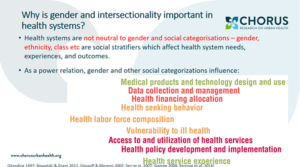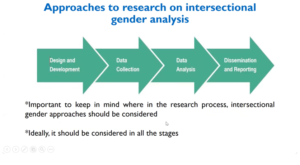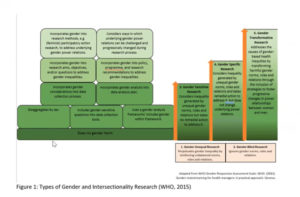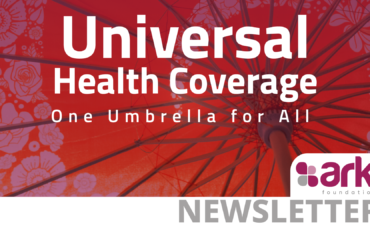A webinar was arranged on ‘Gender and Intersectionality Planning” on 10th January 2022. The objective of the webinar was to provide guidance on using the gender and intersectionality framework (CHORUS’ Gender and Intersectionality Guide) to reflect on the data collection and to further shape the health systems intervention to be developed as part of the current CHORUS projects.

The webinar was led by Sushama Kanan, from ARK Foundation in Bangladesh, who provided a brief overview of the gender and intersectionality guidance and how to use it, looking at the Morgan et al. 2016 framework. She emphasized why gender and intersectionality are important for health systems research and how to ensure all dimensions of gender and the intersections with poverty and other social characteristics are incorporated into health systems research.

Abriti Arjyal from Herd International, Nepal, discussed the WHO TDR toolkit and provided an understanding of how it relates to the gender guidelines. She focused on examining the different steps that researchers need to consider while using the toolkit. She explained how gender power relations intersect with other social stratifiers, such as wealth, caste and disability, to create impact people’s lives. She highlighted the gender relations domains in terms of social stratifiers and infectious disease of poverty domain.
Dr. Joe Hicks from the University of Leeds then presented on how gender and intersectionality variables can be included during the secondary data analysis and designing the quantitative data collection (sampling tool) and analysis. In particular, he explained how we can look at the interactions between intersecting variables (gender, wealth, etc) rather than only exploring their additive effect.

Dr Helen Elsey shared the WHO Gender Resource Assessment Scale (WHO, 2011. This can be found in the Gender and Intersectionality Guide). She pointed out the importance of talking about gender in research and considering gender and intersectionality during intervention design, and ensuring gender inequality is not perpetuated through research work. Under the WHO Scale, gender specific research takes action to remedy unequal norms and transformative research addresses root causes of inequality to transform social norms. While we are working for our project 1 research to be gender sensitive, we can use our intervention co-creating approach to take remedial or even transformative action to ensure no group is disadvantaged.
Read the full story: https://chorusurbanhealth.org/gender-and-intersectionality-webinar-10-january-2022/



